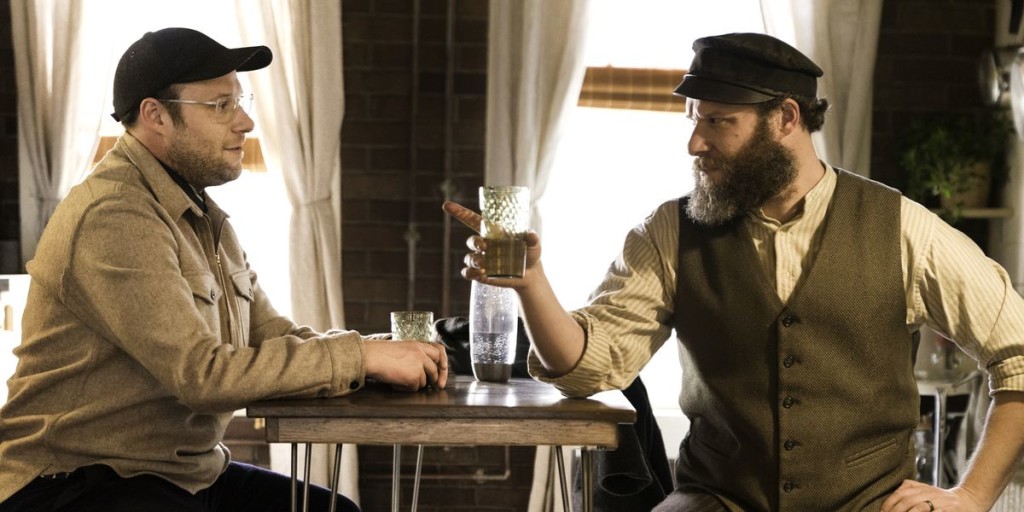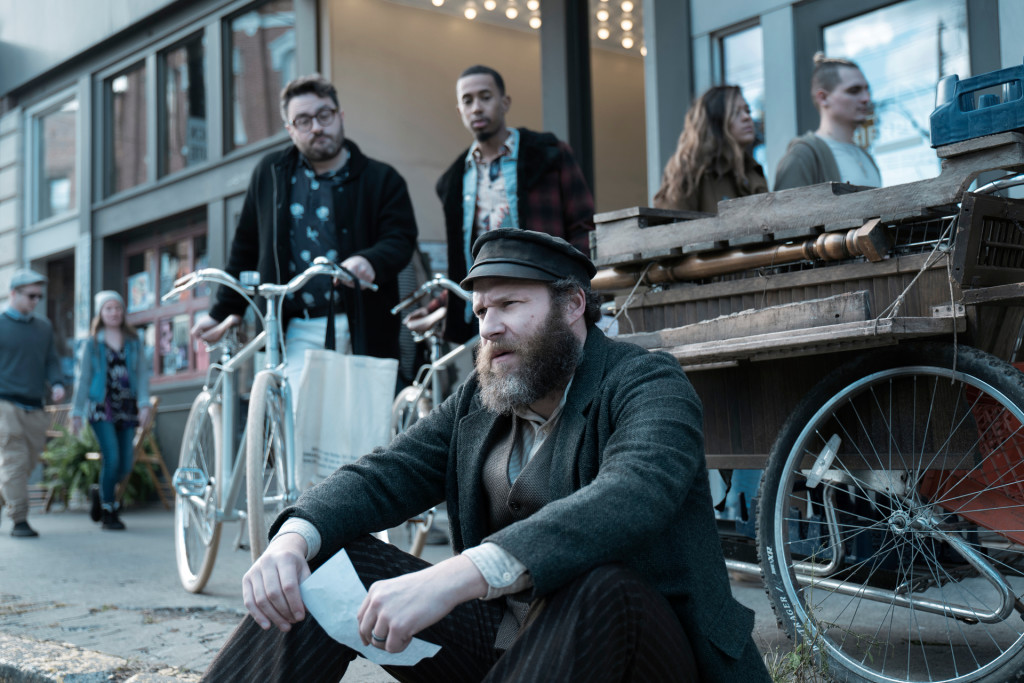Today’s quirky script feels like something that would’ve topped the 2010 Black List.
Genre: Comedy
Premise: A Jewish immigrant accidentally gets brined in a giant pickle barrel, perfectly preserving him for 100 years, after which he’s discovered and must learn to live in the year 2020.
About: What’s that thing I keep telling all of you to do? What’s that thing I keep saying is the new spec script? Oh yeah, SHORT STORIES. Today’s movie is yet another adaptation of a short story, this one titled, “Sell Out,” by Simon Rich, which appeared in the New Yorker in 2013. Rich started writing short stories for the New Yorker in 2007. He would go on to be one of the youngest writers ever hired on Saturday Night Live. He would later become a staff writer at Pixar. He wrote this screenplay adaptation himself. An American Pickle can be seen on HBO’s new streaming service, HBO Max.
Writer: Simon Rich
Details: 90 minutes long
The great thing about the streaming boom is that it allows for non-traditional movies that never would’ve been produced to get made, widening the breadth of options the viewer has so they aren’t forced to watch superheroes and Jedi every day of the week.
It’s sort of a more audience-friendly version of the independent film boom of the 90s. That era also gave us a bunch of unique options when we went to the theater. But there’s more of a commercial spirit to today’s offbeat choices. An American Pickle feels like a weird hybrid between a Charlie Kaufman movie and Pineapple Express.
It begins with Herschel Greenbaum, a Jewish man who, with his wife, escaped poverty and war to immigrate to the United States in 1919. When he accidentally falls into a pickle brining barrel at his work, he is preserved for 100 years and wakes up in the year 2020.
The good news is that Herschel has a great-great-grandson, Ben, who allows him to stay at his place in Brooklyn. After getting used to all the creature comforts of the 21st century (Herschel has a particular affinity for seltzer water), Herschel finds out that Ben has spent the last five years trying to perfect his big idea app which tells you whether a company is ethically responsible or not.
Herschel asks why hasn’t he actually, you know, started the company? Ben makes excuses, saying it still needs work and blah blah blah. Herschel is confused. It looks ready to him. Later that day, the two get in a fist fight with two guys on the street due to a misunderstanding by Herschel, which leads to their arrest. Just like that, all Ben’s work has gone down the drain. How can you have an app that rates how ethical you are if you, yourself, have been arrested for assault and battery!
Ben kicks Herschel out, who now sees Ben as his nemesis. He decides to start a business in what he knows best – PICKLES! Herschel finds hundreds of daily discarded cucumbers and jars in the dumpster behind a supermarket and begins making pickles. When a hipster Brooklyn blogger stops to have a taste and learns that these are the world’s most natural pickles (Herschel even uses God’s water – rain!), Herschel becomes a social media sensation.
Ben becomes furious that Herschel has found success when he’s failed and makes it his mission to sabotage Herschel. After getting the New York Health Board to shut Herschel down, Herschel somehow becomes even more popular via his brash antiquated views on society. Women belong in the kitchen, he insists (keep in mind, he’s from 1919 Eastern Europe), and before he knows it, he has millions of conservative Americans thanking him for challenging the restrictions on free speech.
But when Herschel finally gets canceled, he’s forced to crawl back to Ben and ask for help. Ben decides to help him get to Canada and, along the journey, realizes that Herschel is the only family he has. The two apologize to each other and begin their friendship anew.
I have a bad habit whenever I start a movie where I check the running time. There’s an industry secret when it comes to running time. If a film is exactly 90 minutes, there was trouble somewhere along the way.
Outside of some super contained thrillers and pared down horror films, nobody sets out to make a 90 minute movie these days. There’s no need to. Sure, back when you had to pay for film, it made sense. But not when you shoot on unlimited storage drives. So when you see a 90 minute run time, the unofficial shortest running time the feature format allows, it’s an indication that the producers had so little faith in the movie they shot that they cut as much of it out as possible.
Which is exactly how American Pickle felt at first. After Herschel gets to the future, we get a 12 minute two guys talking in an apartment scene, which was odd considering this movie had the kind of budget that allowed it big special effects time-lapses of New York changing over 100 years. It felt like we’d missed something, a whole other subplot that had been axed, maybe.
But American Pickle picks up once Herschel and Ben become enemies. No doubt the ‘rivals’ plotline was manufactured. But you quickly overlook that because Herschel’s pursuit to become a pickle magnate was so funny. The idea of making pickles you found from the garbage and selling them for 12 dollars a piece in Brooklyn rides the line between reality and satire so perfectly, you can’t help but laugh when customers eat Herschel’s schtick up.
What I also liked about American Pickle is that it was ambitious. Simon Rich wanted to make a statement about where we were as a country and he used Herschel in every way possible to put a mirror up to ourselves. When Herschel learns about Twitter and starts making controversial statements and getting canceled for it but then also supported for it, it was a way to look at our current situation without ever getting into the annoying angry argumentative side of things. You could laugh no matter which side you were on. That takes a lot of skill in this environment.
The only reason I’m not rating this movie higher is the clumsily explored religious plot line. There’s this subplot about Herschel wanting Ben to take ownership of his Jewish heritage and Ben resisting. But it’s so scattered and inconsistent that it never works.
I suspect this is where the cuts happened that resulted in the 90 minute runtime. I feel like there were lots of extra religious-focused scenes and they determined those scenes either weren’t working or weren’t funny enough.
The problem is the climax is all about Ben accepting his religion. That meant they were locked into that storyline. So they had to include at least one other major scene about religion, which they did in the first act, and then ditched it until the end. So if that storyline felt off to you, that’s probably why.
It’s an interesting dilemma for screenwriters for sure. These are the kind of subplots that give our scripts meaning. It’s what makes a movie like this more than an Adam Sandler movie. Yet in a comedy, these are always the first scenes to get cut. The producers are looking at that edit every day nervous about the script losing momentum, nervous about 2-3 minutes going by without a laugh. And because they’re watching it over and over and over again, they have even LESS patience than the audience. So bye-bye religious plot.
But, as screenwriters, I believe we need to leave these plots in the script. If they don’t make the final cut, th e’s nothing we can do about that. But these are often the scenes that make the reading experience more potent and, therefore, our scripts more memorable.
On top of everything else, Seth Rogen does a great job as both characters, especially Herschel. I would often forget they were the same person. I’m usually wary of these “one actor two roles” movies because they’re always vanity projects. When was the last time one of these “one actor two roles” things genuinely worked? The Social Network? And that wasn’t even a vanity project. Armie Hammer was just trying to get a job. But yeah, as crazy as it is to say, the chemistry between Rogen and Rogen was really good.
If you have HBO Max, check this out!
[ ] What the hell did I just watch?
[ ] wasn’t for me
[x] worth the stream
[ ] impressive
[ ] genius
What I learned: This movie doesn’t take off until Herschel has his goal – create a successful pickle business. Before that moment, I was sitting there thinking, “What the heck is this movie about??” So if your movie is wandering, or you’re getting that note from people, just have one of your main characters establish a STRONG GOAL. And he’ll bring the movie with him. That’s the thing about a character goal. It’s not about saying, “Screenwriting books say I need a goal so I must include one!” No no no. The reason you include a goal is because every goal requires ACTION to obtain it. In other words, a goal instantly makes your character ACTIVE (ACTION = ACTIVE). And characters who are active are always more interesting than characters who are not.



